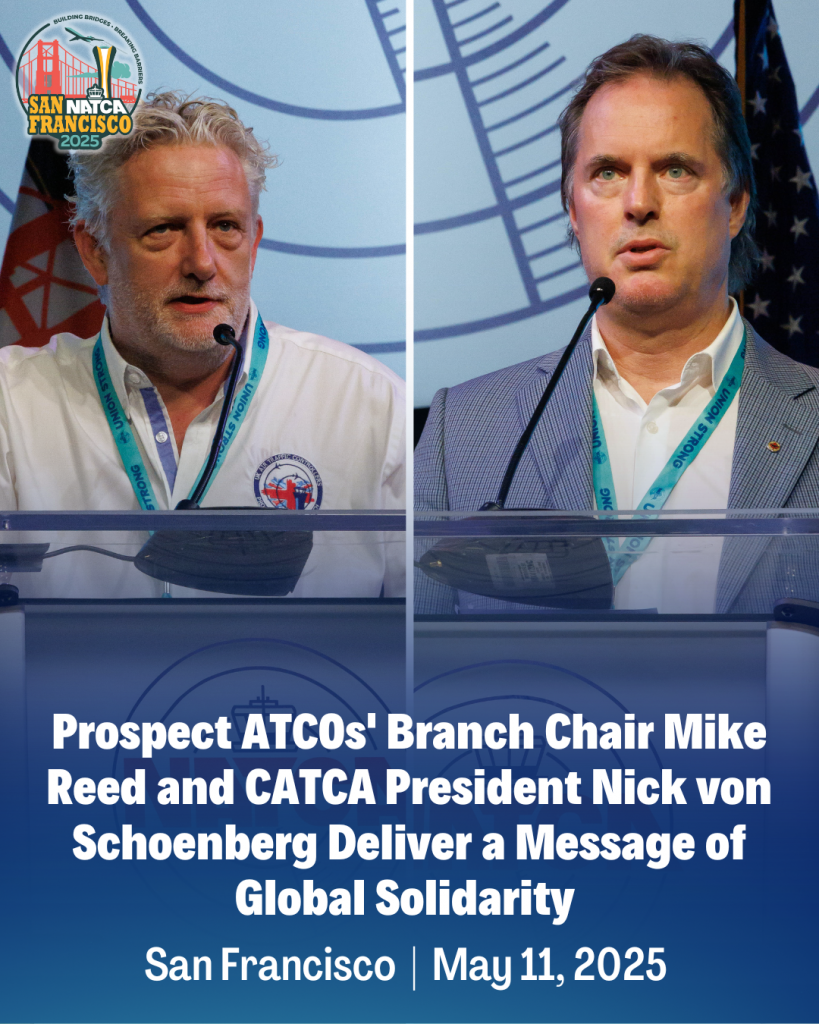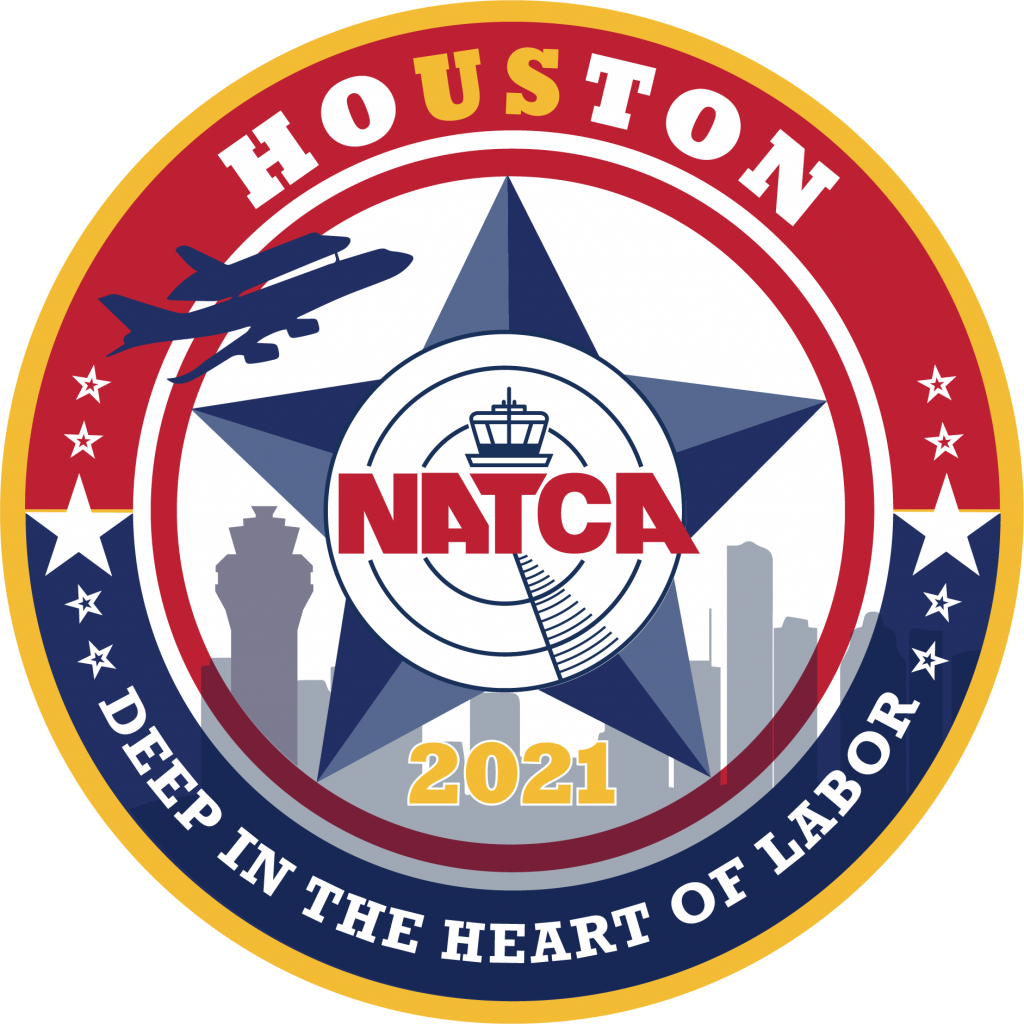
18th Biennial Convention Recap
18th Biennial Convention, Houston: Recap
Video Library
Business Report
The 18th Biennial Convention in Houston, held the first week of December 2021, was focused exclusively on the business of the Union, as carried out by the convention delegates. With professionalism and poise, our convention delegates carried out their duty to conduct our Union’s business and represent each of our nearly 16,000 brothers and sisters around the country. We were honored to be able to safely bring delegates together to discuss issues that are vital to our Union and make any changes to the NATCA Constitution that the convention body deemed necessary to ensure a strong future for our members and the National Airspace System. We’ve detailed all of the discussion and votes made by your delegates at the convention, including video footage and documentation of the business conducted on the convention floor.
The Delegate: Convention Preview Issue
NATCA produced a 10-page Houston convention preview edition of The Delegate, our official convention publication. You can view the entire issue here.
Do You Need Any Information? How Can We Help? Questions?
Send an email here.
Agenda
All times CST and are subject to change.
Wednesday, Dec. 8
3-5 p.m. | Registration
Thursday, Dec. 9
8 a.m. – 9:30 p.m. | Registration
11:30 a.m. – 12:45 p.m. | Lunch (Houston Ballroom, Level 2)
1-3:15 p.m. | Convention Business
3:15 – 3:45 p.m. | Break
3:45-5:45 p.m. | Convention Business
6-7 p.m. | Dinner (Houston Ballroom, Level 2)
7-9:30 p.m. | Convention Business
9:30 p.m. – midnight | Member Reception (Level 2)
Friday, Dec. 10
7 a.m. – 1 p.m. | Registration
7-7:45 a.m. | Breakfast (Houston Ballroom, Level 2)
8-10 a.m. | Convention Business
10-10:30 a.m. | Break
10:30 a.m.-1 p.m. | Convention Business
1 p.m. | Lunch (Level 4, outside of Texas Ballroom)
Convention 2023 Charities
NATCA Charitable Foundation
The NATCA Charitable Foundation (NCF) is a nonprofit 501(c)(3) corporation that works to make a difference in the lives of many. NCF has no paid employees and continues to be a 100% volunteer organization of all ages and professions. This keeps costs down and helps ensure donations make a difference to those most in need. NCF’s philanthropic efforts stretch across the country. NCF seeks out areas of need that go un-funded or are missed through other donor drives. It seeks out smaller charities that help the underserved in the communities where NATCA members live and work. Across the country, through NCF, NATCA members and their family and friends give and volunteer to make a big impact and help bring smiles to those in need.
NCF is supporting four charities and sponsoring events around Houston in honor of NATCA’s 18th Biennial Convention:
American Foundation for Suicide Prevention (AFSP)

The American Foundation for Suicide Prevention is dedicated to saving lives and bringing hope to those affected by suicide. AFSP creates a culture that’s smart about mental health through education and community programs, develops suicide prevention through research and advocacy, and provides support for those affected by suicide. Led by CEO Robert Gebbia and headquartered in New York and with a public policy office in Washington, D.C., AFSP has local chapters in all 50 states with programs and events nationwide. Join the conversation on suicide prevention by following AFSP on Facebook, Twitter, Instagram, and YouTube.
The AFSP Mission:
Save lives and bring hope to those affected by suicide
AFSP Positioning Statement:
We are a voluntary health organization that gives those affected by suicide a nationwide community empowered by research, education and advocacy to take action against this leading cause of death.
Calls to Action:
• Make Mental Health a National Priority
• Have an Honest Conversation
• You are Not Alone
• Have a #RealConvo about Mental Health
• We can #StopSuicide
• Suicide is Preventable
• Talk Saves Lives
• Watch out for the signs. Save a life.
• Be a Lifesaver
• Create a Culture that’s Smart about Mental Health
Lone Survivor Foundation

The Lone Survivor Foundation (LSF) restores, empowers, and renews hope for wounded service members, veterans and their families through health, wellness, and therapeutic support.
Lone Survivor Foundation is here to help America’s wounded service members, veterans and their families adjust to the effects of their experiences and help them transition into what may be looked at as their ‘new normal’ – providing an understanding and acceptance of who they are as a person, a family, and a community.
LSF provides support to service members, veterans and families from all military branches who are challenged with injuries.
LSF accomplishes its objectives through the following initiatives:
- Conducting retreats at various ranch facilities that support wounded service members and their families affected by post-traumatic stress disorder (ptsd) and serious combat injury.
- Emphasizes the use of natural settings and outdoor activities to heal and empower wounded service members and their families through targeted recreational and sports therapy opportunities.
- Reduce the wounded service members need for narcotic pain management; stabilize and enhance family structures and relationships through education, counseling, support, and inspiration using short-term retreats and advocacy programs.
- Identify, connect with, and establish therapeutic support for wounded service member families.
Snowdrop Foundation

Childhood cancer patients demonstrate indestructible attitudes and spirit while battling the life threatening illness of childhood cancer. The snowdrop symbolizes hope and purity. Snowdrop Foundation celebrates the hope that one day a cure for all childhood cancers will be found allowing the purity of every child to remain untouched by the devastating diagnosis of cancer. Snowdrop Foundation donations are designated for four specific areas:
Snowdrop Scholarship Program: Scholarships to qualified, college bound, Board of Director approved pediatric cancer patients. To date, over $494,000 in scholarships have been awarded.
Teen Program: The Teen Program is a support program for teenage patients within the Cancer Center. The teen support group plans activities for teenagers, ‘Chelsey’ Easter Egg Hunt, Snowdrop Toy Drops, Bling for Bravery, Fun activities.
Watch these videos to learn more:
● Ashton Kutcher 2017 congressional testimony https://youtu.be/hUmyEjy5QRM
● Thorn CEO Julie Cordua on TED Talk https://youtu.be/uFt-q8HgYpI
Learn more about Thorn’s work and strategy to eliminate child sexual abuse material at https://www.thorn.org/csam-strategy/Join the NATCA Charitable Foundation in supporting Thorn to give vulnerable children a voice.
Convention 2023 Hotel & Travel

The Diplomat
As one of two union hotels in the city of Houston, the Houston Convention Committee is excited to join our membership at the Marriott Marquis Houston. Located in downtown Houston, the hotel has spacious guest rooms and suites with pool, park, or city views and deluxe amenities. The hotel boasts an infinity pool and the world’s largest Texas-shaped rooftop lazy river. Access Houston attractions easily from the theater district to shopping on foot or via the METRORail lines.
Click here to book your hotel room!
Learn more about The Diplomat, including dining options, photos, and amenities. | Map
Hilton Honors – Enjoy Perks in Hollywood, Fla.: Become a Marriott Bonvoy member and download the Bonvoy app today to enjoy benefits at the Marriott Marquis in Houston, including free Wi-Fi, mobile check-in, and keyless entry into your room.
Learn more | Benefits | Join Marriott Bonvoy
Convention 101: Selecting Local Delegates
Article VIII
National Conventions:
Section 2. Only elected delegates or their alternates may conduct the business of the Convention. Any member in good standing may attend the Convention and speak on any issue.
Section 3. Delegates and any alternates must be active members in good standing of the Association and of their respective Locals. No paid employee of any Local or of the Association, other than duly elected officials, shall be a delegate.
Section 4. Delegates and any alternates shall be determined by procedures set forth in each Local’s constitution and bylaws. The Local is not required to conduct a mail ballot for convention delegates unless specifically required in their local constitution.
Section 5. Each Local shall be entitled to one delegate. Each Local shall be entitled to an additional delegate for every 50 active members in good standing over and above 100 members. Each delegate shall be entitled to cast a number of votes equal to the number of active members in good standing in his or her Local thirty (30) days in advance of the opening of the Convention, divided by the number of delegates representing the Local properly registered and credentialed at the time of the vote.
Convention 101: Robert’s Rules of Order
Summary
Robert’s Rules provide common rules and procedures for deliberation and debate in order to place the whole membership on the same footing and speaking the same language. The conduct of ALL business is controlled by the general will of the whole membership – the right of the deliberate majority to decide.
Robert’s Rules provides for constructive and democratic meetings, to help, not hinder, the business of the assembly. Under no circumstances should “undue strictness” be allowed to intimidate members or limit full participation.
Underlying Principles
- Only one matter may be considered at a time
- It is the right of the majority to rule
- It is the right of the minority to be heard
- The rights of the absentee member must be protected
- Informed decisions and judicious action by an organization require free and impartial debate within a reasonable length of time
- All members are entitled to equal justice and fairness from the other members and officers
- Responsible membership demands courtesy to and from others at all times
Classification of Motions
| Main Motions | Subsidiary Motions | Subsidiary Motions | Subsidiary Motions | Motions That Bring A Question Again Before The Assembly |
|---|---|---|---|---|
| Bring business before the assembly | Assist the assembly in treating or disposing of a main motion Lay on the table Previous Question (close debate) Limit or Extend Limits of Debate Postpone to a Certain Time (or Postpone Definitely) Commit (or Refer) Amend Postpone Indefinitely | Related to the parliamentary situation in such a way that it must be decided before business can proceed Appeal Consider by paragraph or seriatim Create a Blank Division of a Question Division of the Assembly Objection to the Consideration of a Question Parliamentary Inquiry Point of Information Point of Order Request for Permission to Withdraw a Motion Suspend the Rules | Deal with special matters of immediate or overriding importance. They do not relate to the pending business of the assembly Fix the time to Which to Adjourn Adjourn Recess Raise a Question of Privilege Call for the Orders of the Day | Bring a question back before the assembly for consideration: Take from the table Rescind or amend something previously adopted Discharge a committee Reconsider |
Precedence of Motions
- Main, Subsidiary and Privileged motions are ranking motions. Ranking motions must be made in order of their precedence, from the lowest to highest. The motions are disposed of in reverse order, from highest to lowest. Any incidental motion which is pending is disposed of first
- When a main motion is pending, motions of higher rank, either subsidiary or privileged, may be made in the order of their rank or precedence, as well as any incidental motion which is applicable or appropriate. Although only one main motion may be pending at one time, any number of ranking motions may be pending at the same time, so long as the last one made is of higher rank than those made previously
- Once a motion or higher rank has been made, only motions of still higher rank can be made. No motion of lower rank is in order until the higher ranking motions are disposed of.
- Higher ranking motions are said to “take precedence over” lower ranking motions and lower ranking motions are said to “yield to” higher rnaking motions
- As an example – Assume that a main motion is pending and a motion to Amend is pending; a motion to Postpone Indefinitely is not in order because it is of lower rank. However, a motion to Postpone to a Certain Time is in order because it is of a higher rank
Purpose and Characteristics of Motions
- It is essential to know the purpose of each motion. In addition to
the purpose, five characteristics must be known about every motion.
- Does it require a second
- Is it debatable
- Is it amendable
- What vote is required for adoption
- Can the vote be reconsidered
- All this information is provided on the “cheat sheet”
Cheat Sheets
Convention Subsidy Request Information
Convention Video Archive
Convention Photo Albums
Convention Past Coverage
2021 Houston
Full Coverage, NATCA Update: Part 1 | Part 2
Remarks, President Rich Santa and regional roll call by RVPs: Click here
Remarks, Executive Vice President Andrew LeBovidge: Click here
Convention Business: Click here
Awards: Click here
Complete Video Library: Click here
Preview Issue, The Delegate: E-version
2018 Philadelphia
Full Coverage, The Delegate: Click here
Preview Issue, The Delegate: E-version
2016 San Diego
The Delegate, Day 1 issue: E-version
The Delegate, Day 3 issue: E-version
2014 Minneapolis
The Delegate, Day 1 issue: E-version
The Delegate, Day 2 issue: E-version
The Delegate, Day 3 issue: E-version
2012 Denver
The Delegate, Day 2 issue:
The Delegate, Day 3 issue:
2010 Honolulu
Convention guide:
Convention News

Save the Date: NATCA Returns to Chicago for 2027 Convention
NATCA is returning to its roots. Delegates at the 19th Biennial Convention in Fort Lauderdale selected Chicago as the site for the 21st Biennial Convention. Scheduled for April 27-29, 2027, the event will take place at the Sheraton Grand Chicago Riverwalk. This landmark gathering coincides with the 40th anniversary of NATCA’s founding. Chicago has a deep labor history, including our own…

Convention Applauds 100% Membership Facilities for Union Solidarity
Delegates in the convention hall cheered as NATCA recognized every facility that has achieved 100% union membership. The moment highlighted the strength of our Union and the deep commitment of members across the country. Reaching full membership is a powerful reflection of solidarity, unity, and shared purpose at the local level. May 11, 2025: Images…

CATCA President Nick von Schoenberg and Prospect ATCOs’ Branch Chair Mike Reed Deliver a Message of Global Solidarity
To open the final day of Convention business, NATCA President Nick Daniels invited Prospect ATCOs’ Branch Chair Mike Reed from the United Kingdom and Canadian Air Traffic Control Association (CATCA) President Nick von Schoenberg on stage to address the Convention Body. Reed and von Schoenberg spoke about the importance of global solidarity, and how through…
Convention 2023 Information
Convention 2021 Information
Convention 101
Additional Convention Resources
Convention Archive
SAVE THE DATE: 20th Biennial Convention
May 9-11, 2025, San Francisco


